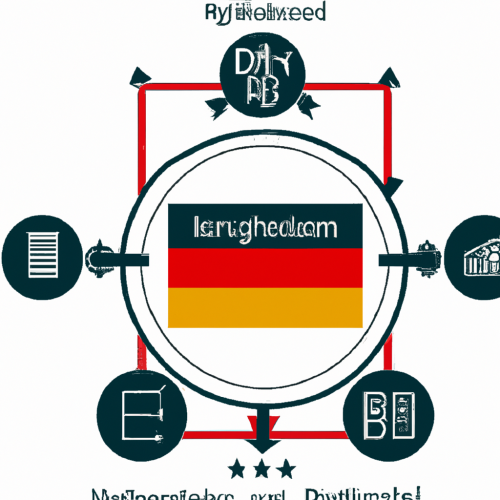Germany is renowned for its first-class higher education system, drawing students from around the globe to pursue their academic dreams in this vibrant and intellectually stimulating country. With an array of world-class universities, state-of-the-art facilities, and a strong commitment to research and innovation, exploring higher education options in Germany has become an increasingly popular choice for students seeking quality education and diverse cultural experiences. This article aims to provide an informative overview of the various opportunities available, the application process, and the benefits of studying in Germany, presenting a neutral perspective for potential students worldwide. Whether you are looking to pursue a Bachelor’s, Master’s, or PhD degree, we will guide you through the exciting labyrinth of educational opportunities that Germany has to offer.
1. Overview of Higher Education System in Germany: A Comprehensive Guide to Academic Opportunities
Germany’s higher education system is highly regarded worldwide, attracting students from all corners of the globe. With its comprehensive range of academic opportunities, Germany offers a plethora of choices for students looking to pursue higher education.
One of the distinguishing features of the German higher education system is its emphasis on academic freedom and autonomy. Universities and colleges in Germany grant the students the freedom to choose their fields of study and shape their own academic paths. This allows students to explore a wide array of disciplines and tailor their education to their individual interests and goals.
Another noteworthy aspect of the German higher education system is its strong research focus. Germany is renowned for its cutting-edge research institutions and substantial investment in scientific advancements. This enables students to engage in groundbreaking research projects and gain hands-on experience in their respective fields.
Furthermore, the German higher education system prides itself on its close collaboration with industry and its commitment to practical learning. Many universities in Germany have established partnerships with leading corporations, offering students valuable internship and job placement opportunities. This not only enhances students’ employability but also provides them with valuable insights into the professional world.
- Wide range of programs: Germany offers a wide array of academic programs across various disciplines, ensuring that students can find a suitable option for their interests and career aspirations.
- Tuition-free education: In most German states, universities do not charge tuition fees, making higher education in Germany accessible and affordable for many students.
- Internationally recognized degrees: Degrees obtained from German universities are highly valued worldwide, providing students with excellent prospects for further education or employment in their home countries or abroad.
- Diverse and inclusive environment: Germany’s higher education institutions foster a welcoming and inclusive atmosphere, attracting students from diverse backgrounds and promoting cultural exchange.

2. Understanding German Universities: Degrees, Programs, and Admission Requirements
German universities offer a wide range of degree programs and educational opportunities for domestic and international students. Before applying, it is essential to understand the various degrees available and the admission requirements to make an informed decision about your academic path.
Degrees: German universities provide a comprehensive array of degrees, including Bachelor’s, Master’s, and Ph.D. programs. The Bachelor’s degree usually takes three years to complete, with a thesis at the end. Upon completion, students can pursue a Master’s degree, which typically lasts two years and offers a more specialized curriculum. For those aspiring to pursue advanced research or academic careers, Ph.D. programs are also available, lasting three to five years.
Programs: German universities are known for their diverse range of programs encompassing various fields, such as engineering, medicine, humanities, social sciences, and arts. From renowned engineering programs at Technical Universities to international business programs at renowned universities like Mannheim or WHU, Germany offers opportunities catering to all interests and career aspirations.
Admission Requirements: Admission criteria may vary depending on the university and program. Generally, international students are required to demonstrate proficiency in the German language, either through language certifications like TestDaF or by completing preparatory German language courses. Additionally, applicants may need to submit academic transcripts, a statement of purpose, letters of recommendation, and in some cases, proof of financial means to cover living expenses during their studies.

3. Exploring Free Education: Tuition-Free Universities for International Students in Germany
Germany is renowned worldwide for its exceptional education system and is an ideal destination for international students seeking tuition-free universities. With a wide range of courses available, free education at German universities is a fantastic opportunity to pursue your academic dreams without the burden of skyrocketing tuition fees.
One of the key advantages of studying in Germany is the absence of tuition fees at public universities for both German and international students. This is made possible by the government’s commitment to providing free education, aiming to promote equal access to higher education for all. Whether you’re pursuing a bachelor’s, master’s, or even a doctoral degree, you can save tens of thousands of dollars by studying in Germany.
Furthermore, studying in Germany opens doors to a world of opportunities. The country boasts renowned universities like the Technical University of Munich and Ludwig Maximilian University of Munich, which consistently rank among the top global educational institutions. The quality of education offered at these universities is recognized worldwide, providing students with a solid foundation for their future careers.
Additionally, studying in Germany allows students to immerse themselves in a vibrant multicultural environment. Interacting with students from various countries not only broadens your perspective but also enhances your cultural awareness. Moreover, many German universities offer a wide range of extracurricular activities, providing students with an all-encompassing experience, from joining sports clubs to participating in student-led organizations.
Take advantage of the tuition-free education system in Germany and pave the way for a successful career while enjoying a culturally diverse academic experience. From high-quality education to a supportive environment, studying in Germany can truly be a life-changing opportunity for international students.
4. Navigating Scholarships and Financial Aid for Study in Germany: Opportunities and Application Processes
Studying in Germany is an exciting opportunity, but the cost of education can be a concern for many international students. Thankfully, there are numerous scholarships and financial aid options available to support your journey. Here, we will explore the various opportunities and provide insights into the application processes.
Scholarship Opportunities:
- DAAD Scholarships: The German Academic Exchange Service (DAAD) offers a wide range of scholarships for international students. These scholarships are available for undergraduate, postgraduate, and doctoral programs.
- Government Scholarships: The German government provides scholarships through various programs such as the Deutschlandstipendium and Erasmus+. These scholarships aim to promote cultural exchange and academic excellence.
- Institution-specific Scholarships: Many universities and colleges in Germany offer their own scholarships to international students. These scholarships may have specific eligibility criteria, so make sure to research and apply accordingly.
Application Processes:
- Early Research: Start exploring scholarship opportunities well in advance. Check the websites of universities, DAAD, and other scholarship programs to find detailed information about eligibility, deadlines, and required documents.
- Prepare Documents: Gather all necessary documents, which may include academic transcripts, recommendation letters, a motivation letter, and proof of language proficiency. Make sure to carefully follow the instructions provided by each scholarship program.
- Submit Applications: Submit your scholarship applications before the deadlines. Be mindful of any additional requirements such as interviews or language tests.
- Keep Track: Keep a record of all the scholarships you have applied for, along with their respective deadlines. This will help you stay organized and ensure timely submission.
Remember, scholarship opportunities may be highly competitive, so strive for excellence in your academics and present a well-rounded application. Take advantage of the available resources and plan ahead to make your study in Germany affordable and memorable.
5. Academic Excellence and Quality Assurance: The Reputation of German Higher Education Institutions
Germany, with its esteemed educational system, has garnered a well-deserved reputation for academic excellence worldwide. German higher education institutions are recognized for their rigorous standards, innovative research, and outstanding faculty. These institutions offer a diverse range of programs and courses catering to both domestic and international students, providing an intellectually stimulating environment for learning and growth.
One key factor contributing to the academic excellence in German universities is their commitment to quality assurance. These institutions adhere to robust quality standards and stringent accreditation processes, ensuring that students receive a first-rate education. Quality assurance measures include regular evaluations, transparent assessment procedures, and continuous improvement initiatives. By maintaining high standards, German universities foster an environment conducive to intellectual development and critical thinking.
German higher education institutions also prioritize research, driving innovation and pushing boundaries across various disciplines. Renowned for their state-of-the-art laboratories, cutting-edge technology, and collaborations with industry, German universities are at the forefront of groundbreaking discoveries and advancements. This focus on research not only benefits students but also contributes to the development of society as a whole.
Additionally, German universities actively promote internationalization, offering a multitude of opportunities for students to engage in global learning experiences. Through exchange programs, internships, and collaborative research projects, students gain exposure to different cultures, broaden their horizons, and develop a global perspective. This international outlook combined with the emphasis on academic excellence makes German higher education institutions highly sought-after by students worldwide.
In summary, the reputation of German higher education institutions is built upon their unwavering commitment to academic excellence, quality assurance, and research. Students can be confident in the high standards upheld by these institutions and the opportunities afforded for personal and intellectual growth. Whether pursuing a bachelor’s, master’s, or doctoral degree, German universities offer a supportive and intellectually stimulating environment that nurtures the pursuit of knowledge and prepares students for a successful future.
6. Choosing the Right University: Factors to Consider and Resources for Research
Factors to Consider When Choosing the Right University
Choosing the right university is a crucial decision that can greatly influence your future academic and professional endeavors. To ensure you make an informed choice, it is important to consider various factors that align with your personal goals, interests, and circumstances. Here are some key considerations to help navigate your decision-making process:
- Academic Programs: Evaluate the range and quality of academic programs offered by different universities. Look for disciplines, majors, and areas of study that align with your interests and career aspirations.
- Location: Consider the geographic location of the university and whether it suits your preferences. Think about whether you prefer a bustling city environment, a serene countryside, or proximity to specific industries or resources.
- Reputation and Rankings: Research the reputation and rankings of the universities that you are considering. While rankings are not the sole determinant of a university’s quality, they can provide some insight into its general standing.
Additionally, it’s crucial to take advantage of the abundant resources available for researching universities. Here are a few valuable resources to aid in your decision-making:
- University Websites: Visit the official websites of the universities you are interested in to gather detailed information about admission requirements, course offerings, campus facilities, and more. This will help you form a comprehensive understanding of what each university has to offer.
- Online Reviews and Forums: Explore online platforms where current and former students share their experiences and opinions about the universities they attended. These firsthand accounts can offer valuable insights into student life, campus culture, and the overall satisfaction of students.
- Career Services: Reach out to the career services offices at the universities you are considering. They can provide information on internships, job placement rates, alumni networks, and other career-related resources that can greatly impact your future professional success.
By carefully considering these factors and utilizing the available resources, you can make an informed decision when selecting the right university for your educational journey.
Concluding Remarks
In conclusion, Germany offers a wide range of higher education options for international students seeking quality education and unique experiences. From its renowned universities to its strong focus on research and practical training, the country has much to offer aspiring scholars.
Exploring higher education in Germany can be a rewarding journey that opens doors to countless opportunities. The tuition-free or low-cost education system, coupled with generous scholarships and financial aid, makes studying in Germany an attractive choice for students worldwide. Additionally, the country’s commitment to internationalization and English-taught programs ensure that language barriers are less of a hindrance.
Furthermore, the German education system stands out for its emphasis on academic excellence, rigorous standards, and practical learning opportunities. Students have access to state-of-the-art facilities, advanced research labs, and collaborations with industry leaders. This unique blend of theoretical knowledge and hands-on experience equips graduates with the skills and expertise sought after by employers globally.
Moreover, Germany’s multicultural society and vibrant student life make it an exciting and inclusive place to study. Students can immerse themselves in the country’s rich history, diverse traditions, and contemporary culture. Whether it’s exploring the bustling cities, enjoying the picturesque landscapes, or participating in student organizations, there is something for everyone.
While the decision to pursue higher education in Germany may be complex, careful planning and research can ensure a successful and fulfilling experience. Prospective students must consider factors such as language requirements, cost of living, application procedures, and potential funding opportunities. Seeking guidance from educational consultants or reaching out to university admission offices can prove invaluable in navigating this process.
In summary, Germany’s higher education system offers a promising blend of academic rigor, practical training, multicultural experiences, and affordability. The vast array of programs and universities cater to a diverse range of interests and aspirations. By considering these valuable options and making informed decisions, students can embark on a transformative educational journey that propels them towards a successful future.





